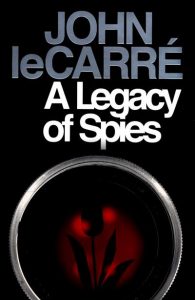A Legacy of Spies
By John LeCarré
Viking, 2017

When I’m not reading crime fiction for fun, I read lots of spy novels, like the Gabriel Allon novels of Daniel Silva, or Jason Matthews’ Red Sparrow trilogy, or the Jerusalem Spy series of Avraham Azrieli. This isn’t meant to be a knock on those writers of engaging thrillers, but reading John LeCarré’s A Legacy of Spies, reminds you why he’s in a class by himself.
A Legacy of Spies continues the story that began in The Spy who Came in from the Cold (1963) and Tinker, Tailor, Soldier, Spy (1974) about the hunt for a mole in the British clandestine service and the consequences of what had to be done in that search to find and eliminate the mole. LeCarré is famous for novels laced with moral ambiguity. Working in a nation’s clandestine service must present challenges to your moral code most every day. Ultimately, you serve the best interests of your country, but you do that through people whom you recruit to spy for you, whom you place in great danger, whom you manipulate for your larger purposes, and whom you may at some point have to sacrifice. All of the novels in this series explore the kinds of choices spymasters must make, queries the justification behind those choices, and probes the impact of those choices on the people who have to make them.
A Legacy of Spies complicates these questions by being set in the present day, long after the events portrayed in the earlier novels occurred, in a time when the Cold War is a distant memory, if it is remembered at all, and when the moral calculus that was operative at the time of those events is rejected by today’s clandestine service.
Peter Guillam, the protagonist of this novel, was a player in all of those events back in the time of The Spy Who Came in from the Cold. At the opening of this novel, he is living quietly in Brittany when he is forced to return to Britain, to the clandestine service, and to his past. It gets really complicated.
This is a novel to read regardless of the extent to which you care about spy fiction for its probing, remorseless, and yet empathetic study of how we humans make the choices we do and how we live with them.
You must be logged in to post a comment.